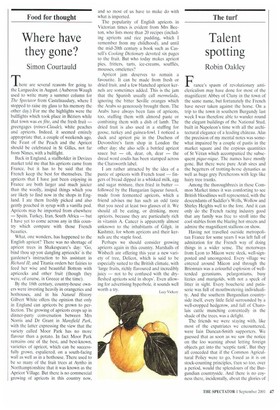Where have they gone?
Simon Courtauld
here are several reasons for going to the Languedoc in August. (Auberon Waugh used to write many a summer column for The Spectator from Castelnaudary, where I stopped to raise my glass to his memory the other day.) For me the highlights were the bullfights which took place in Beziers while that town was en fete, and the fresh fruit — greengages (reines-Claude), white peaches and apricots. Indeed, it seemed entirely appropriate that, a couple of weekends ago, the Feast of the Peach and the Apricot should be celebrated in St Gilles, not far from Nimes, with a bullfight.
Back in England, a stallholder in Devizes market told me that his apricots came from France, but it has to be said that the French keep the best for themselves. The apricots that I have just been enjoying in France are both larger and much juicier than the woolly, insipid things which you are likely to find now in the shops in England. I ate them freshly picked and also gently poached in syrup with a vanilla pod. Apricots may be imported from elsewhere — Spain, Turkey, Iran, South Africa — but I have yet to come across any in this country which compare with those French beauties.
What, one wonders, has happened to the English apricot? There was no shortage of apricot trees in Shakespeare's day: 'Go, bind thou up yon dangling apricocks' is the gardener's instruction to his assistant in Richard H; and Titania orders her fairies to feed her wise and beautiful Bottom with apricocks and other fruit (though they were, of course, in Greece at the time).
By the 18th century, country-house owners were investing heavily in orangeries and hothouses, and in his Natural History Gilbert White offers the opinion that only in England can apricots be grown to perfection. The growing of apricots crops up in dinner-party conversation between Mrs Norris and Dr Grant in Mansfield Park, with the latter expressing the view that the variety called Moor Park has no more flavour than a potato. In fact Moor Park remains one of the best, and best-known, varieties of apricot, which can be successfully grown, espaliered, on a south-facing wall as well as in a hothouse. There used to be so many of the fruit trees at Aynho in Northamptonshire that it was known as the Apricot Village. But there is no commercial growing of apricots in this country now, and so most of us have to make do with what is imported.
The popularity of English apricots in Victorian times is evident from Mrs Becton, who lists more than 20 recipes (including apricots and rice pudding, which I remember from my childhood), and until the mid-20th century a book such as Cassell's Cooking Dictionary devoted six pages to the fruit. But who today makes apricot pies, fritters, tarts, ice-creams, souffles, mousses, omelettes?
Apricot jam deserves to remain a favourite. It can be made from fresh or dried fruit, and a few blanched apricot kernels are sometimes added. This is the jam that the Spanish usually call mermelada, ignoring the bitter Seville oranges which the Arabs so generously brought them. The Arabs have always been fans of apricots, too, stuffing them with almond paste or combining them with a dish of lamb. The dried fruit is also used in a stuffing for goose, turkey and guinea-fowl. I noticed a duck and apricot pie in the Duchess of Devonshire's farm shop in London the other day: she also sells a bottled apricot sauce but — oh, dear, oh, dear — the dread word coulis has been stamped across the Chatsworth label.
I am rather attracted by the idea of a purée of apricots with French toast — fingers of bread dipped in a whisked milk, egg and sugar mixture, then fried in butter — followed by the Hungarian liqueur barack, made from fermented apricots, which a friend advises me has such an odd taste that you need at least two glasses of it. We should all be eating, or drinking, more apricots, because they are particularly rich in vitamin A. Cancer is apparently almost unknown to the inhabitants of Gilgit, in Kashmir, for whom apricots and their kernels are the staple food.
Perhaps we should consider growing apricots again in this country. MarshaIls of Wisbech are offering this year a new variety of tree, Delicot, which is said to be especially suited to the British climate. with 'large fruits, richly flavoured and incredibly juicy — not to be confused with the dryfleshed apricots sold in shops'. Even allowing for advertising hyperbole, it sounds well worth a try.


























































 Previous page
Previous page